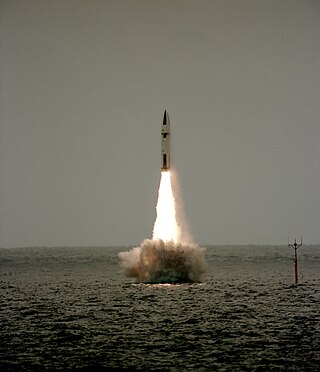
The Treaty on the Non-Proliferation of Nuclear Weapons, commonly known as the Non-Proliferation Treaty or NPT, is an international treaty whose objective is to prevent the spread of nuclear weapons and weapons technology, to promote cooperation in the peaceful uses of nuclear energy, and to further the goal of achieving nuclear disarmament and general and complete disarmament. Between 1965 and 1968, the treaty was negotiated by the Eighteen Nation Committee on Disarmament, a United Nations-sponsored organization based in Geneva, Switzerland.

Nuclear disarmament is the act of reducing or eliminating nuclear weapons. Its end state can also be a nuclear-weapons-free world, in which nuclear weapons are completely eliminated. The term denuclearization is also used to describe the process leading to complete nuclear disarmament.

A weapon of mass destruction (WMD) is a biological, chemical, radiological, nuclear, or any other weapon that can kill or significantly harm many people or cause great damage to artificial structures, natural structures, or the biosphere. The scope and usage of the term has evolved and been disputed, often signifying more politically than technically. Originally coined in reference to aerial bombing with chemical explosives during World War II, it has later come to refer to large-scale weaponry of warfare-related technologies, such as biological, chemical, radiological, or nuclear warfare.

The Atomic Weapons Establishment (AWE) is a United Kingdom Ministry of Defence research facility responsible for the design, manufacture and support of warheads for the UK's nuclear weapons. It is the successor to the Atomic Weapons Research Establishment (AWRE) with its main site on the former RAF Aldermaston and has major facilities at Burghfield, Blacknest and RNAD Coulport.
The British American Security Information Council (BASIC) is a non-partisan think tank based in London. BASIC takes an inclusive approach to promote nuclear disarmament and non-proliferation by working with politicians, civil society, and other people who share this vision, as well as with those who might oppose it.

In 1952, the United Kingdom became the third country to develop and test nuclear weapons, and is one of the five nuclear-weapon states under the Treaty on the Non-Proliferation of Nuclear Weapons.

The US–UK Mutual Defense Agreement, or the 1958 UK–US Mutual Defence Agreement, is a bilateral treaty between the United States and the United Kingdom on nuclear weapons co-operation. The treaty's full name is Agreement between the Government of the United States of America and the Government of the United Kingdom of Great Britain and Northern Ireland for Cooperation on the uses of Atomic Energy for Mutual Defense Purposes. It allows the US and the UK to exchange nuclear materials, technology and information. The US has nuclear co-operation agreements with other countries, including France and other NATO countries, but this agreement is by far the most comprehensive. Because of the agreement's strategic value to Britain, Harold Macmillan called it "the Great Prize".
The United Nations Institute for Disarmament Research (UNIDIR) is a research institute of the United Nations focused on disarmament and international security. It was established in 1980 by the United Nations General Assembly with the stated purpose of informing states and the global community on questions of international security, and to assist with disarmament efforts so as to facilitate progress toward greater security and economic and social development for all.
Janet Elizabeth Bloomfield was a British peace and disarmament campaigner who was chair of the Campaign for Nuclear Disarmament (CND) from 1993 to 1996.

The Scottish Campaign for Nuclear Disarmament campaigns for the abolition of nuclear weapons and is one of nine partner organisations of the International Campaign to Abolish Nuclear Weapons (ICAN) active in Scotland.

Royal Naval Armaments Depot Coulport, shortened to RNAD Coulport, on Loch Long in Argyll, Scotland, is the storage and loading facility for the nuclear warheads of the United Kingdom's Trident programme.
Defence Nuclear Material Transport Operations refer to the movements of military Defence Nuclear Materials (DNM) within, to and from the United Kingdom. Defence Nuclear Material Transport Operations are also known as DNM Transportation; Defence Nuclear Material in transit; Nuclear movements; and DNM movements.

The Dreadnought class is the future replacement for the Royal Navy's Vanguard class of ballistic missile submarines. Like their predecessors they will carry Trident II D-5 missiles. The Vanguard submarines entered service in the United Kingdom in the 1990s with an intended service life of 25 years. Their replacement is necessary for maintaining a continuous at-sea deterrent (CASD), the principle of operation behind the Trident system.

Trident, also known as the Trident nuclear programme or Trident nuclear deterrent, covers the development, procurement and operation of nuclear weapons in the United Kingdom and their means of delivery. Its purpose as stated by the Ministry of Defence is to "deter the most extreme threats to our national security and way of life, which cannot be done by other means". Trident is an operational system of four Vanguard-class submarines armed with Trident II D-5 ballistic missiles, able to deliver thermonuclear warheads from multiple independently targetable re-entry vehicles (MIRVs). It is operated by the Royal Navy and based at Clyde Naval Base on the west coast of Scotland. At least one submarine is always on patrol to provide a continuous at-sea capability. The missiles are manufactured in the United States, while the warheads are British.

The anti-nuclear movement in the United Kingdom consists of groups who oppose nuclear technologies such as nuclear power and nuclear weapons. Many different groups and individuals have been involved in anti-nuclear demonstrations and protests over the years.
VERTIC is a non-governmental organisation established in 1986 to promote effective verification of international agreements. VERTIC is primarily concerned with arms control and disarmament, peace and environmental agreements. VERTIC has an international outlook, and is based in London.

Global Zero was an international non-partisan group of 300 world leaders dedicated to achieving the elimination of nuclear weapons. The initiative, launched in December 2008, promotes a phased withdrawal and verification for the destruction of all devices held by official and unofficial members of the nuclear club. The Global Zero campaign works toward building an international consensus and a sustained global movement of leaders and citizens for the elimination of nuclear weapons.

The United Kingdom's Polaris programme, officially named the British Naval Ballistic Missile System, provided its first submarine-based nuclear weapons system. Polaris was in service from 1968 to 1996.
Action AWE is a grassroots activist anti-nuclear weapons campaign/group launched in February 2013. Its aim is to increase and activate public opposition to the UK Trident nuclear weapons system, and depleted uranium warheads manufactured at AWE Burghfield, along with AWE Aldermaston.

The Campaign for Nuclear Disarmament (CND) is an organisation that advocates unilateral nuclear disarmament by the United Kingdom, international nuclear disarmament and tighter international arms regulation through agreements such as the Nuclear Non-Proliferation Treaty. It opposes military action that may result in the use of nuclear, chemical or biological weapons, and the building of nuclear power stations in the UK.











